Delicate Balance Between Connecting, Being Connected

In a way, it’s a great time to be alive.
With some effort, you can reach out and find out about anything you’re thinking about; you can research and become an “instant” expert on any subject; you can choose from a world of entertainment; and with a little bit of patience, you can connect with virtually any of the 7B plus people on the planet.
Better yet, we can share that information, knowledge, entertainment and experiences with the virtual world. Heck, not long ago, I saw a woman snap a foodie with her iPhone of a Bubba Burger!
Mobile smartphones, tablets, laptops and the Internet have let us blur the lines between work and our personal life.
You can connect with and entertain, inform, irritate and hurt people you know and don’t know 24/7.
The EFF (Electronic Frontier Foundation) has determined that communications is a right not a privilege; so you have a right to tell us what you’re eating, reading, watching, what you’re doing and how you’re feeling even if no one gives a rat’s ***!
Cameras, sensors in phones, public spaces, devices have become so ubiquitous people feel empowered to share … everything.
The Hospital Administrator added, “Wonderful what we can do nowdays.”
 Feelin’ Good – Originally, iNet connectivity and websites were for friends/relatives to get together no matter where they were located. Then it grew and grew and people found it was a great way to express themselves and really feel good about it. Today, there’s an ad behind every screen but still we Tweet, Like, Link, Tube.
Feelin’ Good – Originally, iNet connectivity and websites were for friends/relatives to get together no matter where they were located. Then it grew and grew and people found it was a great way to express themselves and really feel good about it. Today, there’s an ad behind every screen but still we Tweet, Like, Link, Tube.
Of course, not everyone is connected and that’s why Zuck’s Facebook formed the Internet organization with Samsung, Nokia, Qualcomm, Ericcson and others.
Google, which doesn’t like the way Facebook is stealing ad/click dollars, has its own approach to improving the world (and the use of Android) with its fiber and wireless activity.
Obviously, their goals are to improve life for all of humanity.
And if they just happen to make a little profit in the process, who’s hurt?
Connectivity (hence devices) is expanding as rapidly as possible. To the delight of Apple, Samsung and the others, the demand shows no sign of abating as people become connected.
 Talking Tools – While the line has been drawn by people who prefer the “regular” size smartphone and those who prefer a phablet, everyone agrees that the smartphone is the always- with-you connected device. Even then though, most families have multiple mobile devices for working/playing. With more simplified, less expensive smartphones being designed for developing countries, you can expect the number of units (and traffic) to continue to grow.
Talking Tools – While the line has been drawn by people who prefer the “regular” size smartphone and those who prefer a phablet, everyone agrees that the smartphone is the always- with-you connected device. Even then though, most families have multiple mobile devices for working/playing. With more simplified, less expensive smartphones being designed for developing countries, you can expect the number of units (and traffic) to continue to grow.
The demand for devices grows exponentially as connectivity equipment and suppliers agree, so the challenge is to get the world online as rapidly as possible.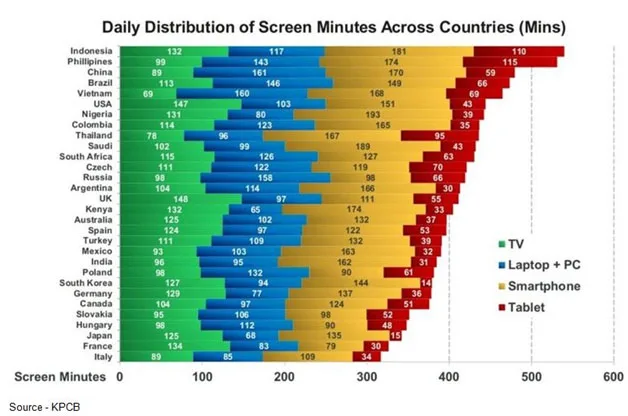
Available, Used – Around the globe, the smartphone is the most widely used/viewed screen and mobile device almost everyone seems to have. In less developed countries like India, Africa and China, sales/use penetration is growing rapidly but still has a long way to go as the infrastructure is also being built to handle the traffic volume.
As one industry executive noted, “Once you’re connected, you’re connected, and you don’t want to look back.”
While you and I enjoy the power and flexibility of our smart devices, companies (hardware and software) see a tremendous opportunity by reaching new customers in poorer countries such as Asia, Africa and Latin America with low-cost connectivity devices.
Both Google and Facebook (and others) are rushing to deliver simplified phones that provide people with services such as email, search and social networking at little or no cost.
The uber-connectivity will ultimately lead to technology being so seamlessly integrated into our lives that it effectively disappears.
Already, Gen Zers (children who are almost born with devices in their hands) have quickly led the way to a feeling of “well, that’s the way the world works.”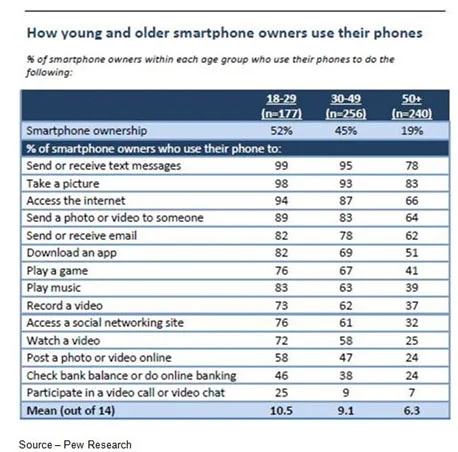
Beyond the Call – The smartphone has become the always-on, always-used mobile device by more and more people with the act of actually making a phone call becoming one of the least used functions. The device has become a constant companion and connection to the world.
The devices are mere extensions of them and their cognitive processes.
They’ve become the means for people to tap into and use the collective intelligence with the Internet.
Of course, as with anything we have/use, there is always a down side/tradeoff.
Along the way (without most people thinking too much about it), the devices and communications networks capture, store and manipulate data and meta data about well, just about everything.
Exec #5 commented, “Souls don’t develop because people become distracted…”
This hasn’t gone unnoticed by the commercial and government sectors which understand the predictive power of data analysis.
Organizations like EFF and civil/civilian rights organizations have given rise to demands for all sectors to be more open in their disclosures.
Organizations like Appthority, an app risk management firm, regularly report that nearly 90 percent of the apps exhibit what they call “risky behavior.”
That phrase may sound worse than you might think because some of the actions you might actually want and find useful — location tracking, accessing your contacts and/or your calendar.
Of course, that also means sharing your data with third-parties like ad networks. But even then, if the ads, coupons and offers are tailored enough for you, you might find the “service” useful.
Paid or free, the apps share more information than you think, which concerns some folks.
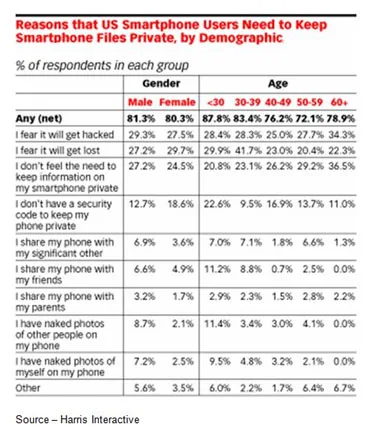 Privacy Concern – While people voice concern about privacy on their phone, it doesn’t stop them from downloading and sharing information and content with people. The phone has almost become a barrier to true personal communications.
Privacy Concern – While people voice concern about privacy on their phone, it doesn’t stop them from downloading and sharing information and content with people. The phone has almost become a barrier to true personal communications.
To me, a more overriding concern than privacy and monitoring is how much time is spent really focusing on the things that really require attention – laughing, crying, learning, being with loved ones, being with yourself.
While people scream and holler about the way “they” filter, censor, track their every activity, I see very few – especially with Gen Zers, simply shutting the devices down.
That’s one of the reasons it is estimated that the average person sees 3,000 – 5,000 ads a day, a significant jump in the volume compared to a few years ago. And most research shows that the number you actually see (those that register) hasn’t increased that much and perhaps has even decreased slightly.
Mrs. Hendry observed, “I don’t think she writes her own material.”
Meanwhile, businesses struggle to devise new, better ways of having their messages register and encourage engagement.
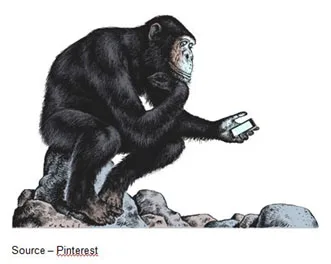 Waiting for You – I’m not sure if people don’t understand how the messaging/email on the smartphone works because they are constantly staring at the screen to ensure they don’t miss something really important. Ignoring others at the table or around you tells them whoever/whatever it is is much more important than you are … wrong!
Waiting for You – I’m not sure if people don’t understand how the messaging/email on the smartphone works because they are constantly staring at the screen to ensure they don’t miss something really important. Ignoring others at the table or around you tells them whoever/whatever it is is much more important than you are … wrong!
You see them being used at the dinner table, in restaurants, in the theater, the elevator and at stoplights. A study by the Harvard Medical School suggests that the majority of Americans under 25 sleep with their devices.
That might be why Arianna Huffington, CEO of HuffPost, said on Jon Stewart’s Daily Show earlier this year that 20 percent of Americans use their phones during sex!
Harry Blackitt heard that and said, “That’s not the point. We could have it any time we wanted.”
Talk about multi-tasking. Talk about sharing!
Hell, I have a tough time getting Siri to call a number while driving and they’re…
Michael Harris, author of The End of Absence, made the point that our lives lack solitude and instead of periodically shutting off, shutting down the devices to daydream, we fill the awkward silence with social media.
Going cold turkey like that is a little more than I’m willing to face; but there has to be a healthy balance between taking advantage of our technological ability to reach and be reached and our constant need to email, Facebook like, YouTube post and retweet to break away from group think.
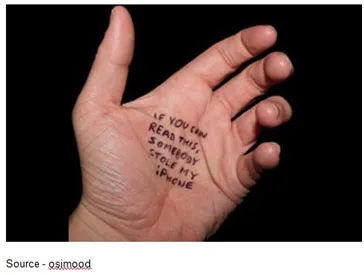 You Can Quit – We know you can quit grabbing, checking your phone any time you want, you just don’t want to. Maybe you feel naked with an empty hand.
You Can Quit – We know you can quit grabbing, checking your phone any time you want, you just don’t want to. Maybe you feel naked with an empty hand.
When you’re so hyper-connected, it’s difficult to think about those closest to you or yourself.
Letting the device vibrate in your pocket during dinner is much better than a Bubba Burger foodie.
Leaving the unit in the kitchen (turned off to save battery) is better for things that happen in the bedroom like … sleep.
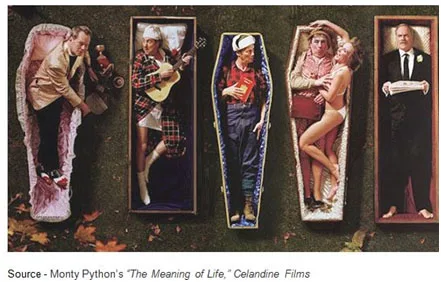 Just remember what the Grim Reaper said, “All you do is talk, and talk, and say ‘let me tell you something’ and ‘I just wanna say.’ Well, you’re dead now, so shut up.”
Just remember what the Grim Reaper said, “All you do is talk, and talk, and say ‘let me tell you something’ and ‘I just wanna say.’ Well, you’re dead now, so shut up.”
# # #